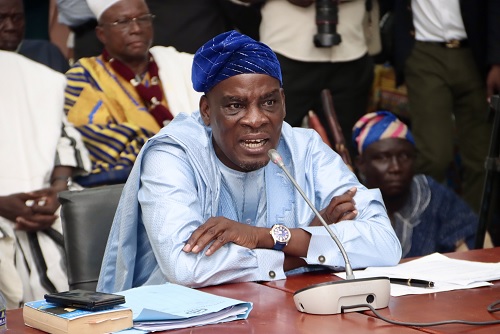
Cash flow woes cripple SHS food supply — Haruna Iddrisu
The Minister designate for Education, Haruna Iddrisu, has stated that the issue of food shortage in senior high schools (SHSs) is a cash flow problem.
He hinted that the government would have to phase out the implementation of the current centralised system of providing food to the schools, stressing that, “we cannot afford any food shortage as the schools run.”
Basis
Mr Iddrisu was answering a question on President Mahama’s campaign promise that his government would formulate a policy to mandate headmasters to procure food items directly with funds that would be transferred to schools.
Currently, the procurement of food items is centralised, giving a monopoly to only two institutions – The Buffer Stock Company and the Ghana Commodity Exchange.
Smooth academic calendar
Mr Iddrisu, who is also the Member of Parliament for Tamale South, observed that over the past eight years, the school feeding for SHSs was largely done in a centralised form, using the two institutions, which allowed for central purchases with the headmasters handling the perishables and school uniforms.
He recalled that on January 10, 2025, the government had to ensure the school calendar was not disrupted by providing adequate food.
Mr Iddrisu said it was also based on how early the Ministry of Finance released those funds, explaining that, “if we are not careful, there would come a time that we have done purchases and major suppliers would say that they won’t do it because they have not been guaranteed or assured.
“So, we have to deal with the cash flow problem, which can be resolved between the Minister of Finance and the Minister of Education.
“For us, it is to ensure that we stop any potential disruption of the school calendar arising out of the lack of or delay in getting these food items to the schools,” he explained.
The minister designate pledged to work with the Buffer Stock and Ghana Commodity Exchange to achieve this goal. He gave an assurance that a defined role would be assigned to heads of schools in the phased-out process.
Holistic education
He said the government was committed to ensuring holistic educational development to meet the national aspiration.
Mr Iddrisu said, for instance, that at the second cycle level, the emphasis would be on foundational learning to enable the country to produce critical thinkers for the future.
He pledged a review of pedagogy and curriculum at all levels of education to meet the country’s future aspirations and for a meaningful contribution to the national development effort.
Model STEM schools
The Minister designate for Education added that the government intended to build a model STEM school in each region from preschool to SHS to produce the right human resources for the future.
He admitted that the country needed to train more people in science and information communications, technology and engineering. He acknowledged the contribution of the previous government in the area of technical and vocational education and training (TVET).
He stressed the need to focus more on TVET to improve employability.
Mr Iddrisu gave an assurance that the government would expand access to all TVET institutions, adding that President Mahama would complete all uncompleted TVET institutions started by the previous government.
Public basic education
Touching on improving public basic schools, Mr Iddrisu said the government’s intervention in education would be all-encompassing.
“We will give true meaning to the Free Compulsory Universal Basic Education (FCUBE),” he stated, adding that the government would look at the dichotomy between rural-urban and northern-southern in the quality delivery of education and more deprived schools not performing because of the lack of teachers.
Mr Iddrisu expressed concern that at the basic level, the country had not achieved the FCUBE, “and you have up there a free senior high school education.”
He, therefore, advocated the allocation of 20 per cent of national expenditure for education or at least five to six per cent of the GDP to support education, so that over a 10-year period, there would have been enough to expand education facilities in the country.
Writer’s email:
